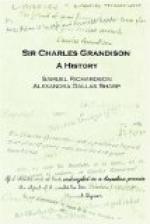Be the cause what it will, answered Sir Charles, you are in a country noted for doing speedy justice, upon proper application to the magistrates. In the same instant he raised first one groaning man, then the other. Their heads were all over bloody, and they were so much bruised, that they could not extend their arms to reach their wigs and hats, which lay near them; nor put them on without Sir Charles’s help.
The men on foot by this time had mounted their horses, and all six stood upon their defence; but one of them was so furious, crying out, that his vengeance should be yet more complete, that two of the others could hardly restrain him.
Sir Charles asked Sir Hargrave and Mr. Merceda, Whether they had reason to look upon themselves as injured men, or injurers? One of the assailants answered, That they both knew themselves to be villains.
Either from consciousness, or terror, perhaps from both, they could not speak for themselves, but by groans; nor could either of them stand or sit upright.
Just then came up, in the chaise, Mr. Lowther and his servant, each a pistol in his hand. He quitted the chaise, when he came near the suffering men; and Sir Charles desired him instantly to examine whether the gentlemen were dangerously hurt, or not.
The most enraged of the assailants, having slipt by the two who were earnest to restrain him, would again have attacked Mr. Merceda; offering a stroke at him with his hanger: but Sir Charles (his drawn sword still in his hand) caught hold of his bridle; and, turning his horse’s head aside, diverted a stroke, which, in all probability, would otherwise have been a finishing one.
They all came about Sir Charles, bidding him, at his peril, use his sword upon their friend: and Sir Charles’s servants were coming up to their master’s support, had there been occasion. At that instant Mr. Lowther, assisted by his own servant, was examining the wounds and bruises of the two terrified men, who had yet no reason to think themselves safe from further violence.
Sir Charles repeatedly commanded his servants not to fire, nor approach nearer, without his orders. The persons, said he, to the assailants, whom you have so cruelly used, are Englishmen of condition. I will protect them. Be the provocation what it will, you must know that your attempt upon them is a criminal one; and if my friend last come up, who is a very skilful surgeon, shall pronounce them in danger, you shall find it so.
Still he held the horse of the furious one; and three of them who seemed to be principals, were beginning to express some resentment at his cavalier treatment, when Mr. Lowther gave his opinion, that there was no apparent danger of death: and then Sir Charles, quitting the man’s bridle, and putting himself between the assailants and sufferers, said, That as they had not either offered to fly, or to be guilty of violence to himself, his friend, or servants; he was afraid they had some reason to think themselves ill used by the gentlemen. But, however, as they could not suppose they were at liberty, in a civilized country, to take their revenge on the persons of those who were entitled to the protection of that country; he should expect, that they would hold themselves to be personally answerable for their conduct at a proper tribunal.




